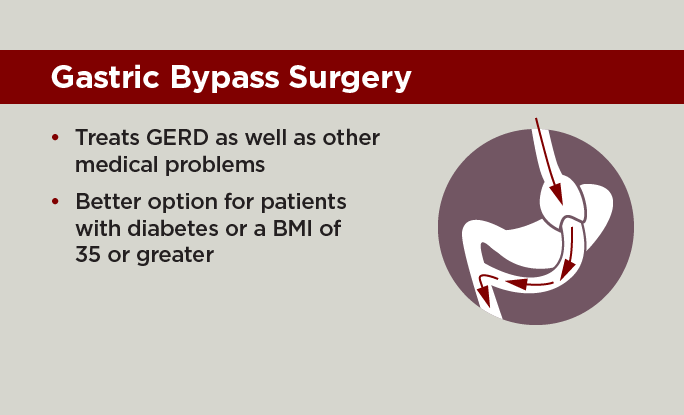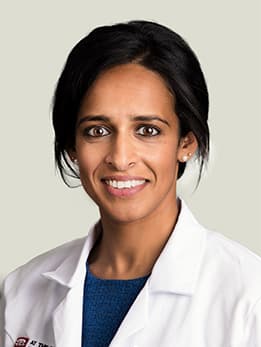What to know about anti-reflux surgery
The sting of acid reflux is all too familiar if you suffer from gastroesophageal reflux disease (GERD).
In most cases, GERD is a chronic condition that people must manage throughout their lives. While a change in diet and anti-acid medications are usually prescribed as the first line of defense, anti-reflux surgery is also an option that can result in better control of symptoms.
This was the case for singer Michael Meadows who for years, was managing reflux with medication.
“I was having a hard time singing,” Meadows said. “I was struggling and losing my voice, the notes just weren’t there anymore.”
I was having a hard time singing. I was struggling and losing my voice.
Meadows had been suffering with reflux for years, yet his local physicians never diagnosed it and instead focused only on repairing his vocal cords.
“One doctor actually told me that anti-reflux surgery wouldn’t work,” Meadows said.
Meadows was referred to the University of Chicago Medicine Center for Esophageal Diseases by his local Indiana physician. The Center for Esophageal Diseases houses a multidisciplinary team of specialists with extensive experience in diagnosing and treating the full spectrum of disorders of the esophagus, from achalasia and other swallowing or motility disorders, to GERD, to Barrett’s esophagus and esophageal cancers.
He met with Yalini Vigneswaran, MD, who specializes in esophageal and gastric disorders and is an advanced minimally invasive gastrointestinal surgeon. Because the Center takes a multidisciplinary team approach to care, Meadows also met with a larger team, who evaluated of all of his symptoms and helped arrive at the GERD diagnosis.
“He had symptoms that some don’t know are reflux, specifically his changing voice,” Vigneswaran said.
Acid reflux, also known as GERD, occurs when stomach acid or bile irritates the food pipe. The valve between the esophagus and stomach will not work, so acid goes into the esophagus and can cause irritation to the vocal cords. When this occurs, it’s not uncommon for people to suffer changes in their voice like hoarseness, vocal fatigue or trouble singing. Another symptom could be constant clearing of the throat and coughing.
He had symptoms that some don’t know are reflux, specifically his changing voice.
This condition can affect anyone regardless of age. Oftentimes, anti-reflux surgery isn’t a treatment option.
For Meadows, his team recommended gastric bypass surgery as an option because he would benefit in a variety of ways. In addition to suffering with reflux, he was diabetic, had high blood pressure, and a high body mass index (BMI) and sleep apnea.
Types of anti-reflux surgery for GERD
There are three types of anti-reflux surgery: Nissen fundoplication, treatment using the LINX device, and gastric bypass.
Nissen fundoplication is the most common treatment for GERD. This operation involves a full 360-degree wrap of the stomach around the esophagus to reconstruct the lower esophageal sphincter to function as a one-way valve again.
The LINX Reflux Management System is a newer treatment option for patients with GERD. This removable device is a small, flexible ring of magnetic, titanium covered beads that acts as a valve to stop reflux from the stomach. The LINX system is designed to stay closed at rest to prevent acid reflux back into the esophagus, but then will expand with a normal swallowing mechanism to allow food and drink to pass into the stomach.
Gastric bypass surgery may be an option for patients who have other medical conditions in addition to reflux. This operation works to treat reflux as well as diabetes, hypertension, sleep apnea, arthritis and allows for dramatic weight loss. Patients with a BMI of 35 or higher may be a candidate for this treatment.

He came in for one concern, and we were able to help with five medical problems.
After detailing gastric bypass and even drawing Meadows a picture, he and his care team decided that surgery was his best option.
“With gastric bypass, we were curing a lot of his ailments. He would be able to reduce the amount of medications for diabetes and high blood pressure, if not cure them all together,” Vigneswaran said.
How is anti-reflux surgery performed?
During anti-reflux surgery, the surgeon will reconstruct and restore function of the lower esophageal sphincter (LES) valve. The LES is a ring of muscle around where the esophagus and the stomach meet. The part of the operation that recreates the valve is called a fundoplication and is performed by wrapping the upper portion of the stomach around the esophagus. The procedure is performed using minimally invasive techniques and is done under a general anesthesia.
With anti-reflux surgery, surgeons will fix a hiatal hernia, when the upper part of the stomach pushes through the diaphragm, if it is present by suturing it closed.
“Meadows had a hiatal hernia that had gone undiagnosed,” Vigneswaran said. “That would definitely make it more difficult for him to sing.”
What should I expect after anti-reflux surgery?
Typically, patients will stay in the hospital overnight. Once at home, patients are encouraged to perform and avoid heavy lifting and demanding activity. Post-surgery pain is usually minimal, for which pain medication may be prescribed.
As far as diet, patients should only eat purees to ensure proper function of the LES valve until they are healed.
“We tell patients to shop and stock their fridge ahead of time as they should only eat soft foods for the first two to four weeks,” Vigneswaran said, “After that, they will not have any specific restrictions and can typically eat regular food.”
How long does it take to recover from anti-reflux surgery?
Recovery varies but most patients are typically able to return to work, if it’s not overly strenuous, after a week. This was nearly the case for Meadows who was back singing on stage two weeks after the surgery.
“I was so nervous but after the third song, I felt good,” Meadows said.
Months later, Meadows was still in awe of how good he felt.
“It was cool that he came in for one concern and we were able to help with five medical problems,” Vigneswaran said, “Anti-reflux surgery isn’t one size fits all but it can be a life-changing surgery.”
For more information about anti-reflux surgery, email our team at Yalini Vigneswaran, MD, MS, is an advanced minimally invasive gastrointestinal surgeon who specializes in esophageal and gastric disorders, including motility disorders, esophageal and gastroesophageal junction cancers, reflux disease and paraesophageal hernias. Anti-reflux surgery is very effective for treating gastroesophageal reflux disease. Specialized esophageal surgeons at UChicago Medicine use minimally invasive techniques to recreate the damaged valve between the esophagus and stomach.
Yalini Vigneswaran, MD, MS
Anti-Reflux Surgery for GERD
